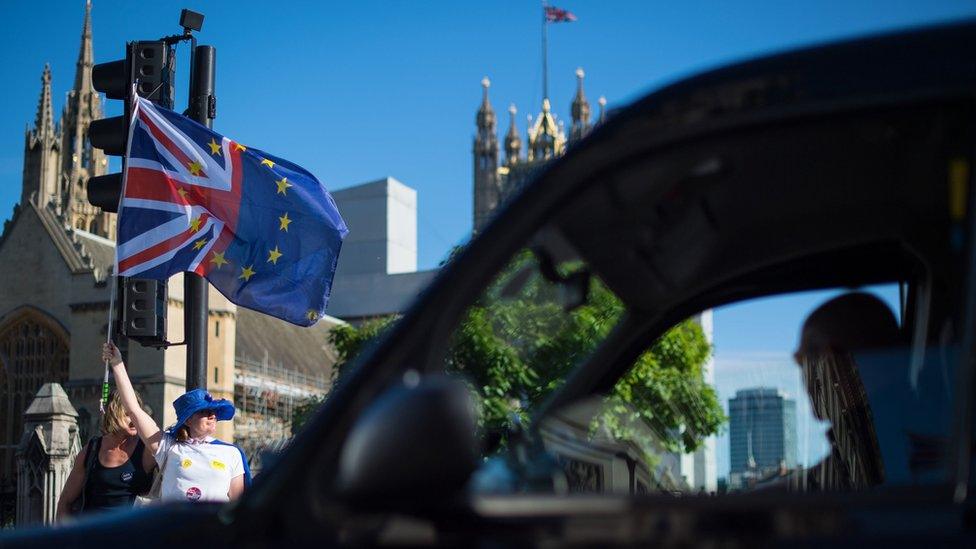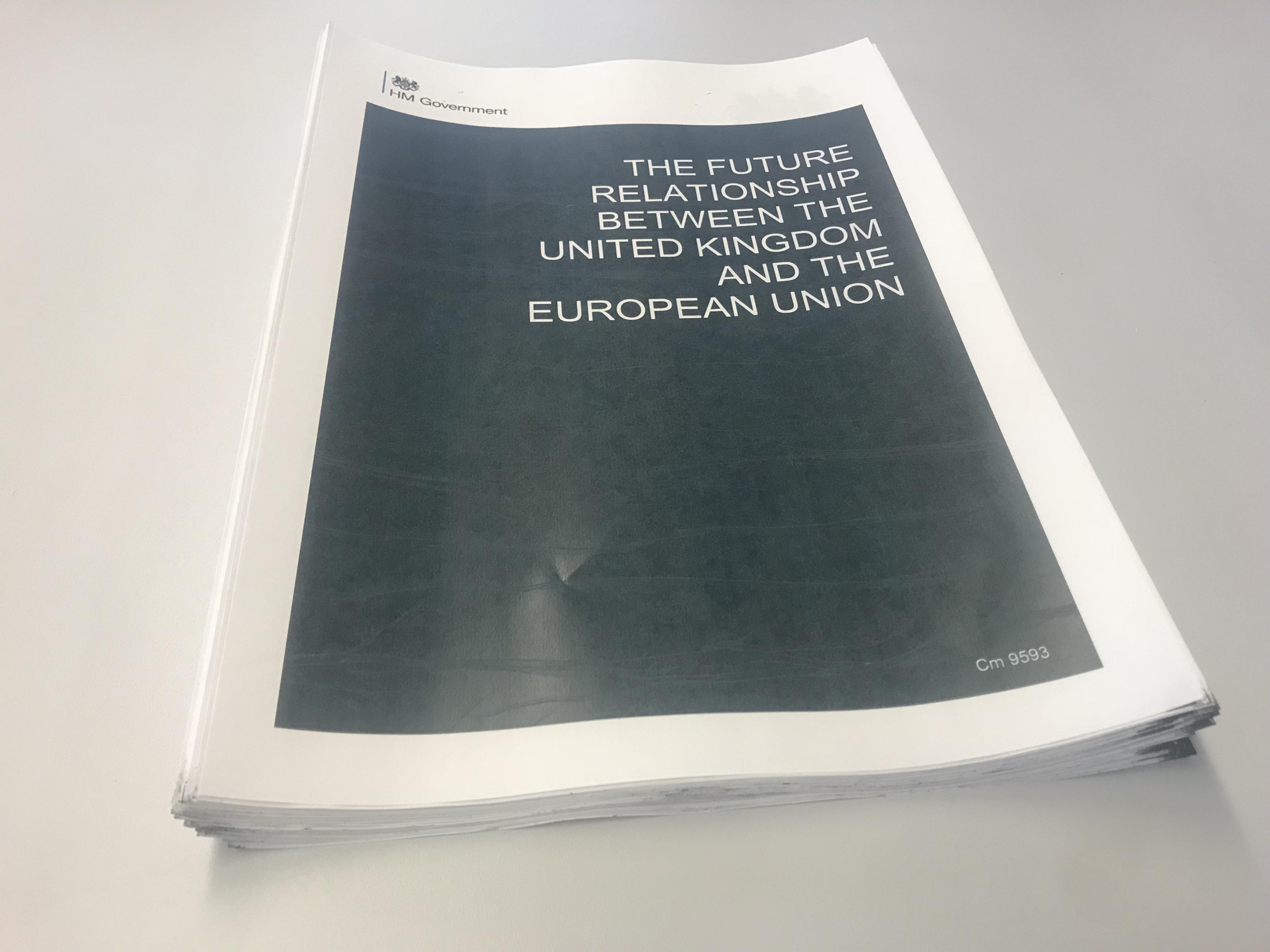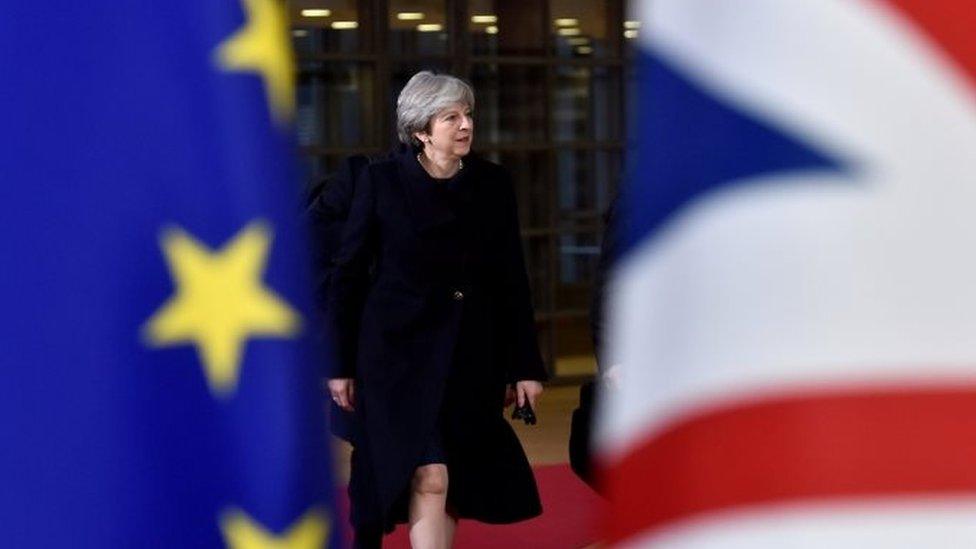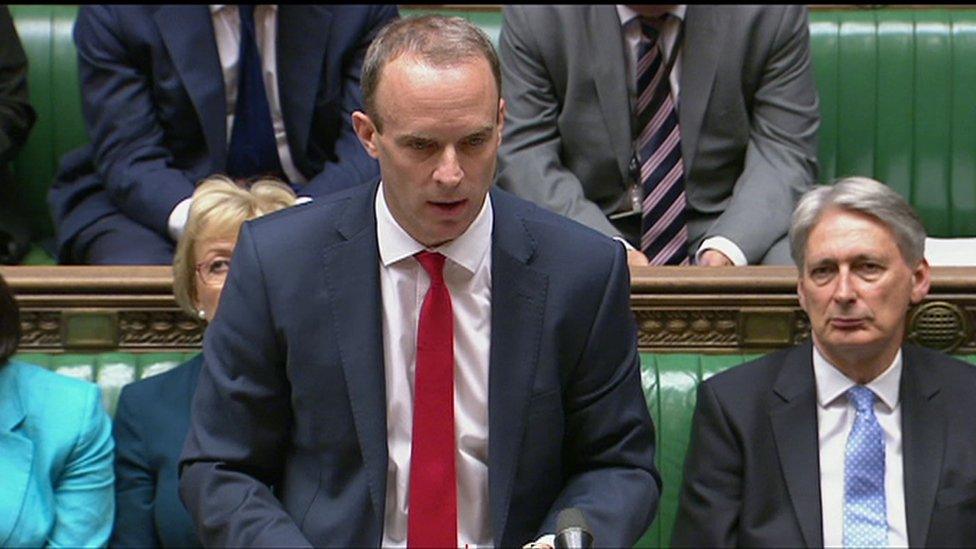Week ahead in Parliament
- Published
- comments

Does the Government have a Commons majority anymore?
Next week we will see the first post-Chequers test of whether disgruntled Brexiteer Tories, deeply unhappy with what they see as the PM's soft-boiled version of leaving the EU, will still toe the party line.
For the last few months the Conservative whips have been seeking to fend off a threat on their Remain flank, posed by a group of up to 20 backbencher arguing for the softest possible Brexit; suddenly the threat comes from 60 to 80 Brexiteers.
And unlike the Remainers, who have the air of refugee aristocrats, struggling to master the insurgent arts, they are mostly habitual rebels, case hardened by the battles of the Major and Cameron years.
In short, the threat confronting the Chief Whip, Julian Smith, is suddenly orders of magnitude greater - and that was before President Trump added his few dimes' worth to the debate.
One of the big determinants of Mr Smith's problems will be the conversations his flock will be having with their Conservative constituency associations over the weekend which will dictate the tone of the coming week; will MPs detect a yearning for unity from their troops, or a burning sense of Brexit betrayal?
If the latter, all kinds of mayhem will follow - enough letters could be submitted to the Chairman of the backbench 1922 Committee, Graham Brady, to trigger a confidence vote in Theresa May.
There might be more resignations, and a serious warning shot or two at the government in the votes due on the Customs and Trade bills, which are due for report stage consideration on Monday and Tuesday.
Theresa May herself will have PMQs, and an appearance before the Liaison Committee, which will give her Tory critics a chance to vent at her. And she might also find herself fielding urgent questions in the backwash of the Trump visit and the NATO summit.
Then there's Boris. Will the former Foreign Secretary, emboldened by presidential praise, seek to take his case to the Commons? I have no information one way or another, but next week provides a wealth of opportunities.
He could speak in the debates on the Trade or Customs bills, or in Wednesday's general EU debate. Or he could opt for a full-dress resignation statement in the manner of Geoffrey Howe.

Angry ex-colleagues can inflict near mortal wounds on Prime Ministers - Geoffrey Howe's evisceration of Margaret Thatcher in 1990 remains the classic example, although based on the opposite view of the EU.
Or there was Norman Lamont's devastating attack on John Major - "in office but not in power". But for maximum effect, the resignee needs a packed House and the presence of his target, so the cameras can cut to her expression as each barb hits home - so a resignation statement after PMQs, giving the Prime Minister little opportunity to escape, and no opportunity to reply, looks to be the way to inflict maximum damage.
Again, I emphasise, this is pure speculation in the absence of actual data - but hey.
Monday 16 July
The Commons opens (2.30pm) with Home Office Questions - and any post-weekend ministerial statements or urgent questions (a reportback on the Nato summit, perhaps) to follow at 3.30pm.
Then comes the first of the week's two big Brexit bills, the Taxation (Cross-Border Trade) Bill, external - the report stage of this measure has been postponed for quite a while, for fear of a Tory Remainer ambush, but now, there's a new threat in the shape of four new amendments from Brexiteers: there are some pointed Brexiteer amendments - and even some chuntering that some Tory MPs might oppose the bill at third reading, to register a protest at the government's Brexit policy.
Brexiteer and former Cabinet minister Priti Patel has new clause 36 which requires that HMRC won't collect other countries' tariffs unless there is a reciprocal arrangement; Bernard Jenkin's amendment 72 says the government will not be able to use powers to implement a customs union without a separate piece of legislation; Craig Mackinley's amendment 73 says the government will have to commit to having a separate VAT system to the EU, and Lawrence Robertson wants to rule out a customs border in the Irish Sea.
Brexiteers are toying with a "proof of life" amendment to remove ministers powers to enact "a" customs union with the EU, on the argument that this is an option ruled out by the Chequers deal.
In Westminster Hall there's a Petitions Committee debate on e-petition 222419, external: "Reject calls to add Staffordshire Bull Terriers to the Dangerous Dogs Act."
In the Lords from 2.30 pm, there's a question on permitting the use of cannabis oil on prescription from the Lib Dem peer Lord Rennard.
The main legislating is the second reading of the Mental Capacity (Amendment) Bill, external. Here, the key issue concerns the Deprivation of Liberty Safeguards for people lacking mental capacity, who are detained for treatment in care homes or hospitals. The final business of the day is a short debate on maximising the income from the National Lottery and its use for the arts and good causes.
Tuesday 17 July
The Commons opens (11.30am) with Business, Energy and Industrial Strategy questions. Will BEIS Secretary Greg Clark, seen as a key cabinet voice arguing for the softest possible Brexit, be targeted by hard Brexiteers on his own side?
Then comes an intriguing Ten Minute Rule Bill from the Conservative Giles Watling, who wants to regulate anti-loitering devices which emit a loud and painful sound that can only be heard by certain age groups, including children and teenagers.
This sound is annoying to the point where people cannot stay in the area. But he believes they are not the right answer to anti-social behaviour, and only drive the problem elsewhere. So he proposes introducing a licence, regulated by a local authority.
The day's main event will be the report and third reading stages of the Trade Bill, external - a Brexit measure designed to establish a framework for UK international trade, outside the EU institutions which have regulated it since 1972.
Recent events may have taken the heat out of the "Soubry" amendment to keep the UK in "a" customs union with the EU. There are several amendments along these lines from various different sources - but normally it's the rebel Conservative amendments which are most dangerous to the government. And the government has put down a raft of changes to meet concerns about excessive ministerial power.

In Westminster Hall debates include government policy on visas for non-EEA workers on inshore fishing vessels (9.30am) led by the Scottish Conservative, Douglas Ross. He warns a shortage of labour is reaching critical levels with some boats being sold and others tied up as crew are simply unavailable. He wants the government to reinstate a previous system allowing non-EEA residents to work on fishing boats.
Labour MP Kate Green leads a debate on homelessness among refugees (2.30pm) and the Conservative Mark Pritchard has a debate (4.30pm) on Nordstream 2 - the new export gas pipeline running from Russia to Europe across the Baltic Sea.
My committee pick is the Education hearing (9.30am) with Apprenticeships and Skills Minister Anne Milton, who will be questioned by her immediate predecessor the committee chair, Robert Halfon.
Not on the committee corridor, the Treasury Committee has a hearing (9am) on the Bank of England's Financial Stability Report (published twice a year looking at the state of the financial system), where the chief witnesses is the Bank of England Governor, Mark Carney, and Financial Conduct Authority Chief Executive, Andrew Bailey. Unusually, possibly uniquely, this will be held at Farnborough Air Show, because the committee accepted an invitation to attend and meet business leaders.
In the Lords (2.30pm), question time includes a call for an inquiry into the implementation of the new railway timetables - from Lord Bradshaw.
The day's legislating will see peers rattle through a series of bills, starting with the second reading of the Ivory Bill, external, where there will be pressure for the extension restrictions on trading to other ivory-bearing animals and to tighten up on cybercrime sales of ivory.
Wednesday 18 July
The Commons opens with Wales questions (11.30am) before the last PMQs before the summer break, at noon.
The day's Ten Minute Rule Bill, from Labour's Madeleine Moon, is on the definition of terminal illness for social security purposes, and then MPs move to consideration of Lords amendments to the Domestic Gas and Electricity (Tariff Cap) Bill, external.

Will MPs remove a Lords amendment to require the Gas and Electricity Markets Authority to develop a relative price cap for suppliers? This would fix the difference between the cheapest rates charged and the most expensive. It is an amendment Labour had previously pushed in the Commons and lost - so expect it to be struck down and the bill returned to the Lords at the end of the day.
The main debate is a general debate (ie on a "neutral motion") on the future relationship between the United Kingdom and the European Union - essentially it is a chance to discuss the Chequers deal on future customs arrangements and the white paper which embodies it.
Which means that ministers could be in for a rough ride. But it will also be worth watching for any possible evolutions in Labour's position - and for any manoeuvres by the small but possibly significant band of Labour Brexiteers.
In Westminster Hall debates include: Russia and the Council of Europe (9.30am); progress on protecting victims of domestic abuse in the family courts (2.30pm); the government's 2017 litter strategy and roadside litter (4pm) and NHS whistleblowers and the Public Interest Disclosure Act 1998 (4.30pm).
My committee pick is the Liaison Committee hearing with Theresa May (3pm) - where the subjects will be Brexit (inevitably); air quality (the subject of a major joint report by an alliance of select committees); defence spending, where the Defence Committee and the Public Accounts Committee have deep concerns about overstretch in the defence budget; and the ever-controversial multi-billion pound programme for Restoration and Renewal of the Palace of Westminster.
In the Lords (3pm) peers polish off the third reading of the Rating (Property in Common Occupation) and Council Tax (Empty Dwellings) Bill, external, followed by the Northern Ireland Budget (Money) Bill, external. There is a 90-minute mini-debate on plans to address obesity, followed by ping-pong on Commons amendments to the Domestic Gas and Electricity (Tariff Cap) Bill - where the main interest centres around the relative price cap amendment added to the bill by peers a couple of weeks ago - which may well have been struck down by MPs.
Thursday 20 July

The Commons opens (9.30am) with Exiting the European Union questions - the new secretary of state, Dominic Raab, has already had a bit of a baptism of fire, after the furious complaints about his failure to provide copies of the Brexit White Paper, when he launched it in the Commons.
Leader of the House, Andrea Leadsom, follows with the weekly Business Statement, which will lay out what MPs will discuss in their first week back, in September, after the Summer recess.
Then the Leader will remain at the dispatch box to move a motion to set up the Commons new Independent Complaints and Grievance Policy. This may not be a simple occasion. Different groups around the Commons have all kinds of concerns about this proposal. Some say it does not go far enough, in that the Commons Standards Committee, dominated by MPs, will remain the ultimate arbiter of complaints.
Some fear that the system will touch off a new tsunami of scandals, despite the considerable protection built in for MPs, including anonymity while complaints are investigated.
There are concerns that the system of handling complaints could lead to very serious offences being handled in-house, with outright rape being treated as "sexual misconduct".
That could lead to accusations of cover-up and offenders being eased out, only for Parliament to be accused of cover-up. Others worry that an internal process could lead to MPs, in particular, being convicted and ruined on a "balance of probability" standard of proof, which could mean serious injustice. This is unwhipped business at a time when many MPs may be absent, or on early holiday - so the policy will probably be approved.
Finally, there will be a general debate on the Tobacco Control Plan.
In Westminster Hall (1.30pm) there's a backbench debate on perinatal mental illness, led by Labour's Dr Paul Williams, a GP and the Conservative, Andrew Selous. They say more than half of women suffer a mental health or emotional problem around pregnancy, which can impact on the developing child as well as the mother, and they want to make sure that the routine health checks around pregnancy, particularly the six week check after birth, should include a check on the mother's emotional and mental well-being.
Unusually for a Thursday, there are a couple of committees in action: Environmental Audit (10.15am) quiz foreign office minister Sir Alan Duncan and Environment Minister Thérèse Coffey on the Changing Arctic, while Public Administration and Constitutional Affairs (10.30am) quiz Britain's top civil servant, the acting Cabinet Secretary, Sir Mark Sedwill, on his work.
In the Lords (11am) the day is devoted to backbench debates.
First is on the value to the UK of higher education as an export; and the second on the impact on parliamentary democracy in the UK of the use of referendums. Then come two energy SI approval motions: on the Warm Home discount; and on the Oil and Gas Authority.
Friday 20 July
The Commons is not sitting, but the Lords meets at 10am to debate three private members' bills
First is the Conservative Lord Lexden's Civil Partnership Act 2004 (Amendment) (Sibling Couples) Bill , externalwhich allows siblings aged over 30 years, to register as civil partners if they have lived together for a continuous period of 12 years immediately prior to the date of registration.
Then comes the Children Act 1989 (Amendment) (Female Genital Mutilation) Bill, external which would take court cases on FGM into family court cases, giving them extra confidentiality. This bill comes from the Crossbencher, Lord Berkeley of Knighton.
Finally there's the European Union (Information, etc.) Bill, external - from the Lib Dem (and ex Conservative) Lord Dykes. This would allow information and statistics about the European Union to be made available and promote town twinning arrangements.